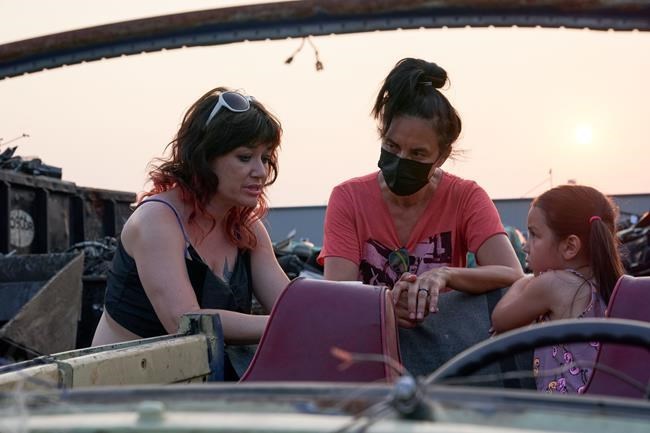
Director Gail Maurice (centre) on set with "Rosie" co-stars Melanie Bray (left) and Keris Hope Hill in a handout photo. Maurice's film "Rosie," about a young Indigenous orphan who's adopted by her francophone aunt, screens at this year's ImagineNative Film and Media Arts Festival. THE CANADIAN PRESS/HO-Photon Films, ** MANDATORY CREDIT**
October 11, 2022 - 7:37 AM
TORONTO - Métis filmmaker Gail Maurice fought for years to get her debut film "Rosie" onto the big screen while staying true to telling an inspiring story of Indigeneity and queer identity.
Many outsiders didn't think she could do it, the Saskatchewan director said in a recent interview. They thought an untested Indigenous filmmaker whose career had been mostly focused on acting couldn't shoulder the responsibility.
"There’s so much institutional racism," she said.
"It’s not spoken, but you know that you’re not getting jobs because of that. You know you’re not getting a directing gig because no one believes you can do it."
Last month, Maurice showed the world she could.
"Rosie" made its debut at the Toronto International Film Festival as a symbol of perseverance for the director. Next, it will close the in-person portion of the ImagineNative Film and Media Arts Festival on Oct. 23 and become available to rent on the festival's website from Oct. 24 to 30 ahead of a theatrical rollout that starts Nov. 11.
The film tells the story of Fred, a francophone woman who becomes the adoptive aunt of a six-year-old First Nations girl in the wake of her mother's death. WithFred'sbest friends Flo and Mo by her side, they form a supportive family that faces the uncertainties of life together.
Lighthearted and whimsical, the dramatic comedy centres on the child and Fred's two pals who exist on the margins of society in 1980s Montreal. Fred works at a sex shop, while Flo and Mo defy the restrictions of gender at a time when society wasn't anywhere close to considering the nuances of queer life.
"Rosie," which is told in English, French and Cree, wanders through many realities. It touches on child services, poverty, the drag scene and the Sixties Scoop, without straying too far from celebrating its characters' strength.
Telling a positive Indigenous story was one of Maurice's career aspirations.
Before she landed TV roles on "Trickster" and "Cardinal," as well as last year's six-time Canadian Screen Award-winning film "Night Raiders," her experiences in the film industry had been mixed.
As recently as 15 years ago, she was reading calls for Indigenous women to play alcoholics, rape victims and other beaten-down characters. She remembers how degrading it felt to consider standing in front of a room of white producers while playing an Indigenous stereotype.
"I said no to a lot of them," she said. "I told my agent I'm not doing that."
Those experiences added up and Maurice said they inspired her to start writing scripts.
She brought "Rosie" to producer Jamie Manning who she'd met while acting in the Tantoo Cardinal-led 2018 film "Falls Around Her." The same year, "Rosie" was made into a short film which got the wheels turning on a feature with Manning's help.
"That’s always something I’m trying to work on as a privileged white person ... seeing something through eyes that aren't mine," the producer explained of his involvement.
"We’re seeing white people remaking the same stories over and over again so why not look at that through a different lens? There’s so many beautiful things out there that we’ve never seen."
Maurice said not everyone shared that perspective.
After securing money from Telefilm Canada, the Indigenous Screen Office and Canada Council for the Arts, the filmmaker turned to Canadian broadcasters to reach her funding goals.
At least one meeting with an executive suggested "Rosie" should lean into darker themes.
"They wanted me to rewrite and make it where there's gay bashing," she said.
"But that's not the story I wanted to tell."
She stuck to her convictions, eventually securing broadcast partnerships with Superchannel and APTN.
Melanie Bray, who plays Fred and is Maurice's girlfriend in real life, hopes the film industry takes a cue from "Rosie" as an example of what can happen if doors are opened for filmmakers and a production team that is relatively inexperienced.
For too long, she said, creators have been turned away on the excuse they didn't have enough credits to their name.
"How do you create change if you don't take a chance? Someone could argue that Gail never made a feature, she won't be able to, and look what she’s done," she said.
Those values were taken to heart during production as a team of mostly women and LGBTQ cast and crew worked to bring "Rosie" to life. Behind the camera, Maurice and others mentored a number of Indigenous filmmakers who were looking to build their knowledge.
"That’s the beauty of such a small team," she said. "You have to forge ahead."
This report by The Canadian Press was first published Oct. 11, 2022.
News from © The Canadian Press, 2022